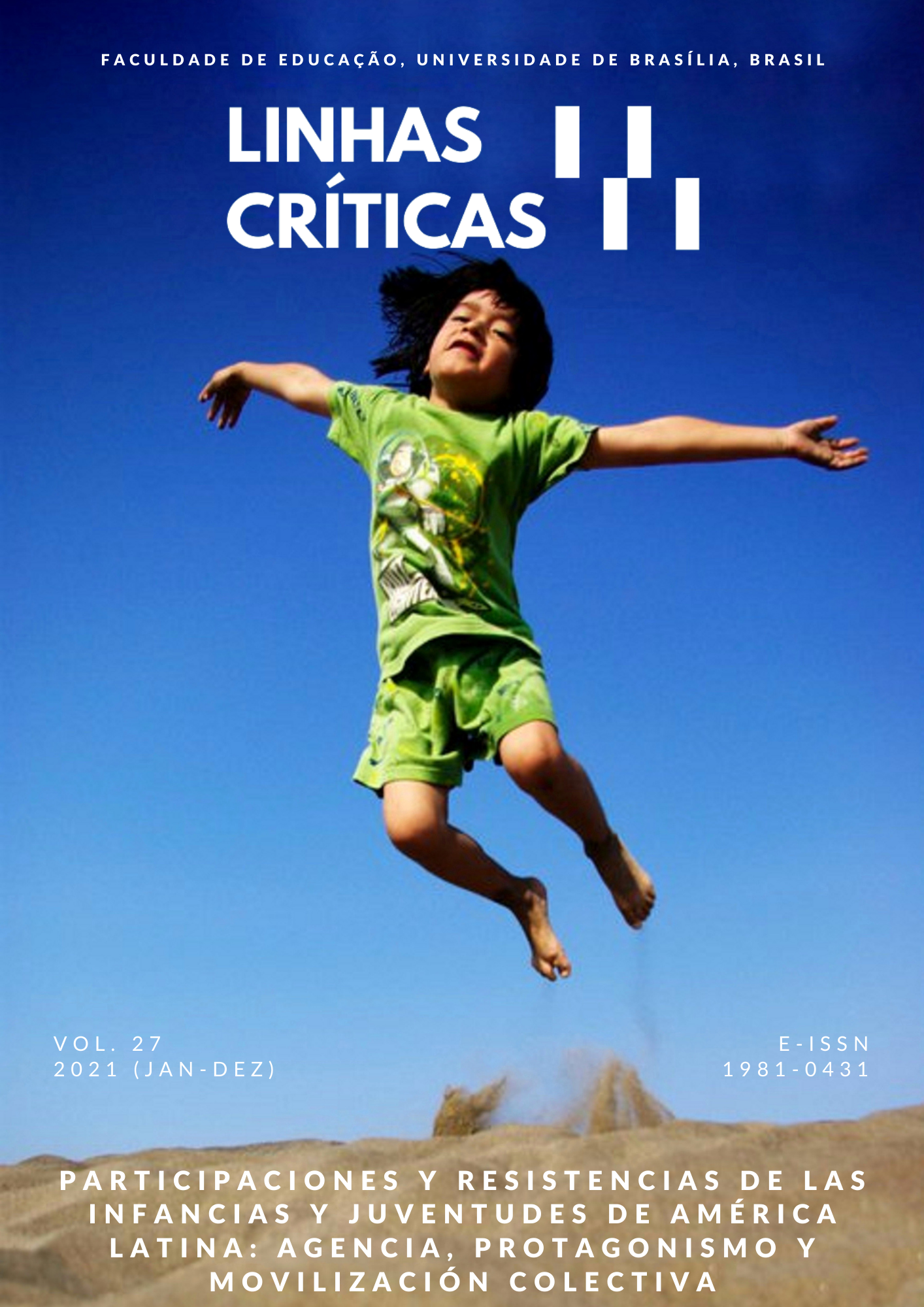Contributions of the literary novel “Red Star” for Teaching of Sciences
DOI:
https://doi.org/10.26512/lc.v27.2021.36059Keywords:
Science teaching, Literature, Critique of EducationAbstract
The aim of the manuscript is to describe the contributions of Krasnaya Zvezda (Red Star), of Aleksandr Bogdanov (1873-1928), for science teaching. The methodology used is the bibliographic research of works on the author's biography and the field of education. For the presentation of the results, which often resembles an essay, there is a brief description of the author's life and some aspects of the art-science relationship. Pedagogical indications are made for their use in the classroom and scientific concepts that can be discussed through "Red Star", advocating that literary work has the potential to generate a discussion in the natural sciences, humanities and languages.
Downloads
References
Adams, M. B. (1989). ‘Red Star’ Another Look at Aleksandr Bogdanov. Slavic Review, 48 (1), 1–15. https://doi.org/10.2307/2498682
Agostinho, M. & Casaleiro, P. (2015). Ciência e arte, SciArt: museus, laboratórios, cientistas e artistas. MIDAS - Museus e estudos interdisciplinares, 5, 1-6. https://doi.org/10.4000/midas.829
Andrade, R. R. D., Nascimento, R. S. & Germano, M. G. (2007). Influências da Física moderna na obra de Salvador Dalí. Caderno Brasileiro de Ensino de Física, 24(3), 400-423. https://dialnet.unirioja.es/servlet/articulo?codigo=5165676
Barroso, M. F. & Borgo, I. (2010). Jornada no Sistema Solar. Revista Brasileira de Ensino de Física, 32(2), 1-12. https://doi.org/10.1590/S1806-11172010000200013
Bogdanov, A. (1984). Red Star: The First Bolshevik Utopia (Translated by Charles Rougle). Indiana University Press.
Bogdanov, A. (2010). Estrella Roja. Nevsky Prospects Editorial.
Bogdanov, A. (2020). Estrela Vermelha (Tradução de Paula Vez de Almeida e Ekaterina Vólkova Américo). Boitempo.
Corrêa, A. L., Araujo, E. N. N., Meglhioratti, F. A. & Caldeira, A. M. A. (2010). História e Filosofia da Biologia como ferramenta no Ensino de Evolução na formação inicial de professores de Biologia. Filosofia e História da Biologia, 5(2), 217-237. http://www.abfhib.org/FHB/FHB-05-2/FHB-v05-n2-12.html
Eisner, E. W. (2004). What can education learn from the arts about the practice of education? International Journal of Education & the Arts, 5(4), 1-13. http://www.ijea.org/v5n4/
Eldred, S. M. (2016). Art–science collaborations: Change of perspective. Nature, Londres, 537: 125–126. https://doi.org/10.1038/nj7618-125a
Engels, F. (2020). Dialética da Natureza (Tradução de Nélio Schneider). Boitempo.
Feitosa, R. A. (2019). Uma crítica marxista à interdisciplinaridade. Acta Scientiarum. Education, 41(1), e37750. https://doi.org/10.4025/actascieduc.v41i1.37750
Feitosa, R. A. (2021). New public policy for teacher training in Brazil: Vincent van Gogh as an inspiration for the action of the Pedagogical Residency program? Policy Futures in Education, 19(1), 28–43. https://doi.org/10.1177/1478210320940129
Fink, A. (2019). Conducting Research Literature Reviews - From the Internet to Paper. UCLA.
Gare, A. (1994). Aleksandr Bogdanov: Proletkult and conservation, Capitalism Nature Socialism, 5(2), 65-94. https://doi.org/10.1080/10455759409358588
Gare, A. (2000). Aleksandr Bogdanov's History, Sociology and Philosophy of Science. Studies in History and Philosophy of Science, Part A, 31(2), 231-248. https://philarchive.org/archive/GARABH
Gerould, D. (1987). Alexander Bogdanov, Founder of Soviet Science Fiction. Science Fiction Studies, 14(2), 271-74. http://www.jstor.org/stable/4239824
Guimarães, M. L. S. (2000). História e natureza em von Martius: esquadrinhando o Brasil para construir a nação. História, Ciências, Saúde-Manguinhos, 7(2), 391-413. http://doi.org/10.1590/S0104-59702000000300008
Helene, O. & Helene, A. F. (2011). Alguns aspectos da óptica do olho humano. Revista Brasileira de Ensino de Física, 33(3), 1-8. https://doi.org/10.1590/S1806-11172011000300012
Huestis, D. W. (2007). Alexander Bogdanov: The Forgotten Pioneer of Blood Transfusion. Transfusion Medicine Reviews, 21(4), 337-340. https://doi.org/10.1016/j.tmrv.2007.05.008
Jensen, K. M. (1944). Beyond Marx and Mach: Aleksandr Bogdanov’s Philosophy of Living Experience. D. Reidel Publishing Company.
Jensen, K. M. (1982). Red Star: Bogdanov Builds a Utopia. Studies in Soviet Thought, 23(1), 1-34. http://www.jstor.org/stable/20099036
Luna, F. J. (2008). Alographia dos álkalis... de Frei Conceição Veloso: um manual de química industrial para produção da potassa no Brasil colonial. Quím. Nova, 31(8), 2214-2220. http://doi.org/10.1590/S0100-40422008000800051
Meth, P. & Williams, G. (2006). Literature reviews and bibliographic searches. In V. Desai, & R. B. Potter (eds). Doing Development Research (pp. 209–221). SAGE Publications, Ltd. https://doi.org/10.4135/9781849208925.n22
Miguel, J. D. (2008). A improvável mistura: Nietzsche, Fedorov, misticismo e ciência na formação do imaginário das vanguardas russas/soviéticas. Imaginário, 13(16), 37-62. https://sites.usp.br/labi-ipusp/revista-imaginario/#arte3
Pasachoff, N. (1996). Marie Curie: And the Science of Radioactivity. Oxford University Press.
Roberts, K. (2006). Art and science: Sci-Art: what are the problems? Biochem, 28(6), 7–11. https://doi.org/10.1042/BIO02806007
Additional Files
Published
How to Cite
Issue
Section
License
Copyright (c) 2021 Raphael Alves Feitosa

This work is licensed under a Creative Commons Attribution 4.0 International License.
Authors who publish in this journal agree to the following terms:
-Authors maintains the copyright and grants the journal the right of first publication, the work being simultaneously licensed under the Creative Commons Attribution License which allows the sharing of the work with recognition of the authorship of the work and initial publication in this journal.
- Authors are authorized to enter into additional contracts separately, for non-exclusive distribution of the version of the work published in this journal (eg publish in institutional repository or as a book chapter), with acknowledgment of authorship and initial publication in this journal.
-Authorers are allowed and encouraged to publish and distribute their work online (eg in institutional repositories or on their personal page) at any point before or during the editorial process, as this can generate productive changes as well as increase the impact and the citation of published work (See The Effect of Free Access).



